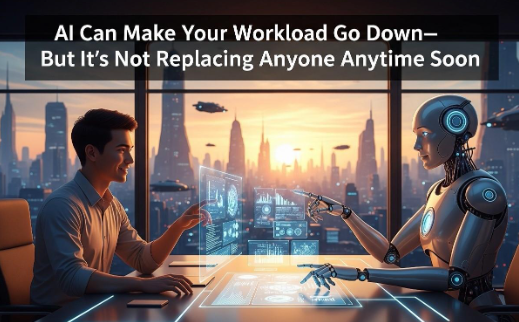Artificial Intelligence is everywhere—in headlines, in conference panels, and in the endless stream of “how-to” videos promising to automate your entire job. And yes, AI can make your workload lighter. It’s incredible at helping with complex research, generating professional-level writing, producing graphics and video, and even suggesting workflow priorities. But here’s the truth: AI still needs a human in the loop. That being said, if you are not using it to your advantage – you are probably on the short list for a pink slip…
The Hype vs. Reality
Many of the slick AI “automation” videos you see online are heavily edited to look like a perfect one-click solution. In reality, AI still requires oversight, guidance, and correction. It’s a powerful assistant—not an autonomous replacement. I have tried many myself to find they had completely overpromised.
If you’re buried in work, AI can help you get caught up. You can even ask it what to tackle first, and most of the time it will give you a reasonable answer—unless it “hallucinates” (yes, that’s the technical term) and invents details. AI is getting better all the time—tools like ChatGPT and Gemini are mind-bogglingly good and just had recent releases where they are getting a little scary in some cases. Some say they’re “as smart as a PhD student,” which tells me they still have a way to go—especially if you’ve ever worked with a PhD student lately…
The Job Market Reality Check
I work primarily in AI security, but my background is in cybersecurity and privacy. In that field, we would hire every qualified person we could find. The problem wasn’t a lack of jobs—it was a lack of trained professionals. This shortage was even more pronounced for good software developers.
Now, I see talented people being laid off and AI is taking the blame. But the reality is different:
Many recent computer science graduates expect salaries close to those of mid-level developers. They want to work from Bali and do not want to take meetings between their breathing exercises… You may say that is a reach but I interviewed that person.
With large companies tightening budgets because they simply over hired, experienced developers are on the market. If you can hire someone who’s ready to work today, you’re less likely to take a chance on training someone new – especially if they have worked with someone on your team in the past.
The job market is still strong if you’re willing to take a reasonable salary and learn on the job. Not so long ago, that was the norm—even for developers. Six-figure salaries while you’re still figuring things out? That’s a relatively new expectation.
I’ve seen the same thing in cybersecurity. I had interns who earned an entry-level certification, were still figuring out how to log into a SIEM, and would show me six-figure job offers from big companies—asking if I could match them. My response? I’d hand them my resume and joke, “If they’re paying you that much, maybe I should apply too.”
Adapting for the Future
If you’re worried about “competing” with AI for your job, consider this: the military and other training-intensive environments still offer paths to learn valuable skills while getting paid. And given the way AI technology is advancing, it’s not far-fetched to think you might be “fighting AI or at least with it” in the future—so you might as well be ready.
The takeaway? AI is an incredible tool. It can help you work faster, smarter, and more creatively. But for the foreseeable future, it’s augmenting human work, not replacing the human workforce wholesale. The people who will thrive are the ones who know how to use AI effectively, adapt to new realities, and keep learning—whether that’s in a tech job, in the field, or somewhere entirely unexpected. If you are I in a field that does not use AI or has been slow to adopt it – become the AI super star and you may be the only employee left if it does start to take over.






Comments